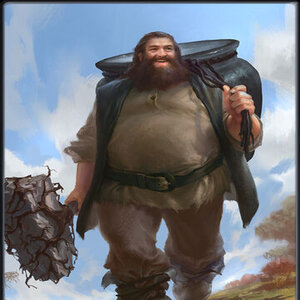
The Dagda
CBUB Wins: 4
CBUB Losses: 0
CBUB Ties: 0
Win Percentage: 100.00%
Added by: Magnamax
Read more about The Dagda at: Wikipedia
Official Site: Public Domain
The Dagda ( ) is an important god in Celtic mythology. One of the Tuatha Dé Danann, the Dagda is portrayed as a father-figure, king, and druid. He is associated with fertility, agriculture, manliness and strength, as well as magic, druidry and wisdom. He can control life and death, the weather and crops, as well as time and the seasons.
He is often described as a large bearded man or giant He owns a magic staff, club, or mace (the lorg mór or lorg anfaid) which kills with one end and brings to life with the other, a cauldron (the coire ansic) which never runs empty, and a magic harp (uaithne) which can control men's emotions and change the seasons. He is said to dwell in Brú na Bóinne (Newgrange). Other places associated with or named after him include Uisneach, Grianan of Aileach, and Lough Neagh. The Dagda is said to be husband of the MorrÃgan and lover of Boann. His children include Aengus, Brigit, Bodb Derg, Cermait, Aed, and Midir.
The Dagda's name is thought to mean "the good god" or "the great god". His other names include Eochu or Eochaid Ollathair ("horseman, great father" or "all-father"), Ruad Rofhessa ("mighty one/lord of great knowledge") and Dáire ("the fertile one"). The death and ancestral god Donn may originally have been a form of the Dagda, and he also has similarities with the later harvest figure Crom Dubh. Several tribal groupings saw the Dagda as an ancestor and were named after him, such as the Uà Echach and the Dáirine.
The Dagda has been likened to the Germanic god Odin, the Gaulish god Sucellos, and the Roman god DÄ«s Pater.
CBUB Match Record:
No Regular Play Records Available
